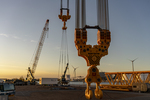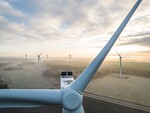News Release from Troutman Pepper Hamilton Sanders LLP
Wind Industry Profile of
COVID-19 and the Renewable Energy Supply Chain
Wind Energy
The wind industry is particularly susceptible to the effects of this disruption because project completion delays could preclude developers from qualifying for the full value of the production tax credit. Critical components for wind projects were already in limited supply prior to the pandemic, and developers may have no viable supply alternatives. Additionally, as COVID-19 spreads across the United States and results in mandatory shelter-in-place requirements, worker availability at project sites could also affect project completion timelines. Given these complications, the industry has begun seeing force majeure claims from EPC contractors, wind turbine suppliers and other vendors.
Solar Energy
Supply chain disruptions are also likely to affect the U.S. solar industry. Because of existing tariffs on Chinese solar panels, U.S. developers often purchase panels from Southeast Asia, where manufacturing facilities have yet to encounter COVID-19-related disruptions on the same scale as China. Although most Southeast Asia-manufactured panels are made with raw materials from China, the availability of raw materials is less vulnerable to disruption relative to manufacturing slowdowns in China. Nonetheless, given the uncertainty about the continued spread of COVID-19 and its impact on panel availability, an increasing number of force majeure notices are likely to be issued moving forward. Similar issues are affecting the availability of lithium ion batteries and related equipment necessary for battery energy storage systems.
Force Majeure – Generally
Force majeure clauses may relieve a party of its contractual obligations when an unforeseeable and extraordinary event prevents such party from performing its obligations despite mitigation efforts. Typically, force majeure clauses list “acts of God” and other specific qualifying events. If epidemics or pandemics are specifically included in a force majeure clause, then a party seeking relief from its contractual commitments may be excused from performance provided that the other requirements are met. Even if epidemics or pandemics are not specified, they may qualify as an “act of God,” or other like category, unless specifically excluded. Whether a global pandemic qualifies as an “act of God” may depend on the jurisdiction and case law addressing the scope of such claims. Global pandemics may also give rise to claims of commercial impracticability, impossibility and illegality.
COVID-19 has the potential to give rise to force majeure claims with respect to labor shortages, supply chain disruptions, enhanced site safety and “social distancing” requirements, delays in the issuance of permits and utility approvals, and the potential for government proclamations that require site shutdowns. Project owners and contractors need to carefully consider their options under EPC and related contracts and begin to actively take steps to mitigate potential impacts (e.g., by updating site safety protocols to limit the risk of infection, accelerating purchase and delivery of equipment and canvassing alternate sources of project labor).
Project Owner Considerations
Project owners should assume a high likelihood of COVID-19-related force majeure claims. The appropriate response will depend upon various factors, including the status of completion of the project, the credit and performance quality of the contractor, any applicable surety bonds, the nature and extent of any other third party deliverables and requirements (e.g., owner-supplied equipment, utility construction, back-feed and inspection requirements, permit issuance and close-out) and available schedule float to meet financing and offtaker timing requirements. For early stage projects (particularly if notice to proceed has not been issued), the owner may prudently elect to suspend projects until greater certainty regarding the impact of the COVID-19 situation becomes clear. For projects substantially under way, the risk of suspension must be weighed against the economic carrying costs associated with the projects.
Owners should identify and be prepared to assert their rights under applicable force majeure provisions. A standard owner response to a force majeure claim should include a timely written demand to the contractor to document specific impacts supporting such claim. Owners should evaluate whether other unexcused contractor delays may give rise to a “concurrent delay” defense to such claims. Owners should also request assurances from the contractor regarding its ability to continue to perform, request copies of any applicable surety bonds, and ensure that any required subcontractor flow-down and step-in rights are in place. Owners that are directly sourcing panels, inverters and other key equipment need to evaluate the possibility that they may have additional exposure related to delays in securing delivery of such equipment.
Contractor Considerations
Contractors should review contractual force majeure provisions and take note of the applicable substantive and procedural requirements. Compliance with these requirements will be critical to the success of any force majeure claims. Best practices include making an initial force majeure notice regarding potential impacts before they may be quantified, with updates as better information becomes available. Contractors should also seek assurances from subcontractors and suppliers regarding their ability and intention to continue to meet downstream obligations. Any applicable sureties should be notified to preserve remedies and to actively involve the surety in the decision as to how to best mitigate impacts. Contractors should meticulously and regularly record any time, cost and efficiency impacts in order to preserve the basis for future claims. Contractors should also note the extent to which the contract affords relief for cost impacts as well as schedule delays. A likely contractor strategy will be to seek an “open book” change order in which the contractor is willing to proceed on a time and materials basis, as opposed to the typical fixed price EPC structure with strict schedule requirements.
Other Project Stakeholders and Considerations
Contract provisions aside, managing COVID-19-related impacts will require active and ongoing discussions between owners, contractors, key subcontractors, sureties, offtakers, utilities and other key project participants about how to move forward. Ultimately, all such parties have strong incentives to go forward, but given the unique and unprecedented scale of this pandemic, it is critically important that key risks be identified and equitably allocated among the parties.
COVID-19 impacts may also affect project owners’ ability to achieve required commercial operation dates and other key milestones under offtake contracts. Unless excused, failure to achieve such milestones may entitle an offtaker to delay liquidated damages. Like EPC contracts, offtake agreements typically contain force majeure provisions excusing project completion delays. A comparative analysis of such provisions is important to assess the ability to claim force majeure based upon underlying contractor claims. Developers should note, however, that even if a qualifying force majeure event occurs, such extensions may be limited if the offtake agreement limits the duration of force majeure relief or specifies outside completion dates for which no equitable extension is permitted. Finally, for hedges and other financially settled offtake arrangements, force majeure events typically do not excuse settlement obligations unless expressly stated to the contrary.
Owners also need to consider the liquidity of the credit markets and the extent to which construction and take-out financing will be available. Financing agreements do not contain force majeure provisions and may have outside commitment dates or MAE clauses, which excuse a decision by the financing provider to not provide committed financing.
The COVID-19 pandemic has also disrupted strategies for ensuring that solar and wind projects will satisfy the “beginning of construction” requirements for purposes of the ITC and PTC, including with respect to both the procurement of equipment and the placing in service of projects. An analysis of these issues prepared by Troutman Sanders tax attorneys is available here
Troutman Sanders LLP is actively working with owners, contractors, and others who have been or may be affected by supply chain disruptions. We are available to set up calls and/or videoconferences or otherwise provide guidance on particular issues for clients.
- Source:
- Troutman Sanders LLP
- Author:
- Press Office
- Link:
- www.troutman.com/...
- Keywords:
- influence, COVID-19, USA, renewable energy, supply chain, worldwide, disruption, projects, timeline, schedule, claim, turbine, PTC



























